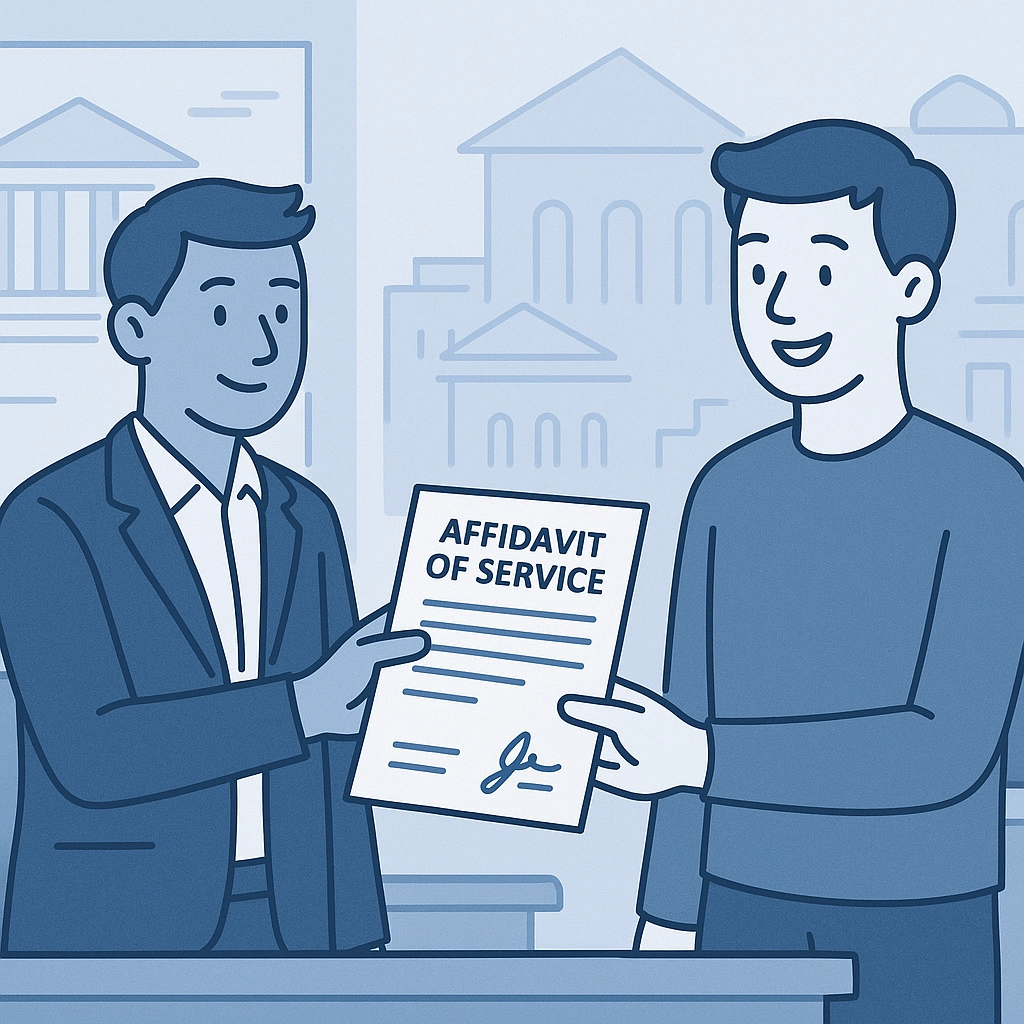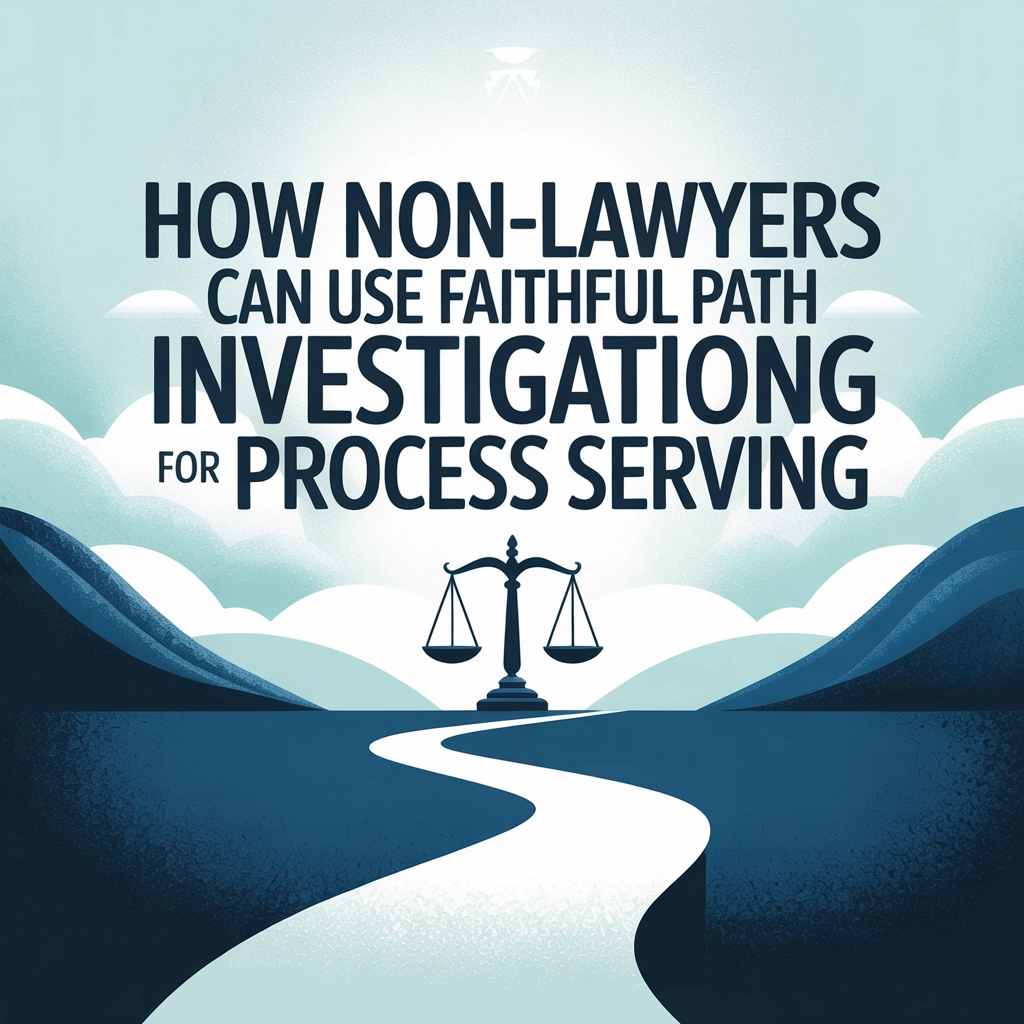Process Serving—Not Just for Attorneys
If you’re an individual, landlord, business owner, or anyone not working at a law firm, you might assume hiring a process server is only for lawyers. Good news: That’s a myth. At Faithful Path Investigations, we help regular folks all the time—whether you’re dealing with a small claims suit, family law issue, property dispute, or another personal matter. Our professional process servers make sure your legal documents reach the right person, legally and in a way that stands up in court.
If you need to “serve” someone legal papers and don’t know where to begin, this guide will walk you through how to confidently use our services (no law degree required).
What Is Process Serving, Exactly?
Process serving is the legal delivery of court papers—like summons, complaints, subpoenas, eviction notices, or restraining orders—to a person involved in a case. The law says these papers must be officially delivered (“served”), and the courts want proof this happened fairly. That’s where a process server comes in.
You can’t just stick papers in someone’s mailbox or hand them to a neighbor. By hiring a professional, you make sure documents are served the right way—protecting your case from costly missteps.
Who Hires Faithful Path Investigations (Besides Lawyers)?
You don’t have to be a legal pro to need process serving. Here are some common clients we help every day:
- Landlords: Serving tenants with eviction notices or court documents
- Individuals: Involved in small claims, divorce, custody, or property suits
- Business Owners: Serving documents to business partners, customers, or employees
- HOA Managers & Property Management: Service for collections, liens, or rules violations
- Nonprofits, Churches, or Civic Groups: Delivery of notices, complaints, or subpoenas
No legal background? No worries. If you’re unsure what to serve or how, we can walk you through the process—just remember, we can guide on process serving logistics, not give legal advice.
What Types of Documents Can You Serve?
Faithful Path Investigations can serve almost any kind of civil legal document, including:
- Summons and Complaints
- Subpoenas (witness or record)
- Small Claims Documents
- Divorce, Custody, or Family Law Papers
- Restraining Orders or Protective Orders
- Notices of Hearings, Judgments, or Depositions
- Eviction Notices
- Cease and Desist Letters
- Business Dispute Papers

Not sure if your document qualifies? If it’s court-ordered or has to be delivered for a legal reason, chances are, we can serve it. If you’re still uncertain, check with the court or a legal self-help website like your state or county court’s page.
The Step-by-Step: How Non-Lawyers Work With Faithful Path Investigations
Here’s exactly what to expect (and what you’ll need to do):
1. Gather Your Court Documents
Before you contact us, be sure you have a clear, court-stamped copy of the papers you need served. Sometimes these come from the courthouse, other times from online case portals.
Pro tip: Make a few copies—you’ll give us one for serving and keep the rest for your records.
2. Submit an Online Intake or Contact Us
Head to our Client Intake Page and fill out the form. Give as much detail as you can about:
- Who needs to be served (name, address, best times to find them, physical description)
- What the case is about (type of document, deadlines, etc.)
- Special circumstances (are they avoiding service, do they work odd hours, etc.)
You can also call or message us directly using the contact info on our Contact Page.
3. We Review Your Request and Build a Service Plan
Once we get your info, we’ll review everything and reach out if we need more details. We’ll:
- Confirm receipt of your documents
- Ask any follow-up questions
- Provide a quote and estimated turnaround time
- Explain what happens next
For tricky cases—like someone who dodges service or has moved—we tap into investigative tools to locate them.
4. Investigation (If Needed)
If the person to be served isn’t easily found, our team can perform background checks, skip tracing, or on-the-ground investigation. We have access to databases and methods the average person doesn’t.

5. Professional, Legal Service of Papers
This is where the magic happens. Our experienced servers:
- Show up when and where most likely to encounter the subject (often at home, work, or known hangouts)
- Wear body cameras for safety and proof (audio and video available for court if needed)
- Act respectfully and discreetly—no drama, no intimidation
- Attempt service multiple times, including evenings or weekends if necessary
We follow your state’s rules on what qualifies as “proper service.” If law allows, and face-to-face isn’t possible, we can post or mail documents, or use alternate legal means.
6. Real-Time Updates and Status Checks
Unlike old-school process serving where you’re left guessing, our clients get regular updates via text, email, or dashboard notifications. You always know the status and get alerts when service is completed or attempted.
We use state-of-the-art software to keep everything organized, transparent, and easy to track. If you ever have questions about your case, just reach out—clear answers, no jargon.
7. Proof of Service—Done Right
After documents are delivered, we fill out a “Proof of Service” or “Affidavit of Service.” This official form details who was served, when, where, and how. We file this with you and, if needed, the court. You’ll need this for your hearing or court date.

If the receiving party tries to claim they weren’t served, this affidavit and our digital evidence help back up your side.
Why Choose Faithful Path Investigations?
- Open to Everyone: We welcome non-legal clients—no stuffy requirements or confusing policies.
- Transparent Process: From quote to final proof, we keep things crystal clear.
- Trustworthy and Professional: We protect your privacy, honor the law, and serve every paper like it’s our own case.
- Persistence Pays Off: For “hard to serve” cases, we don’t quit—check out our deep-dive post: Hard to Serve, Not Impossible.
- Technology Forward: Online portal, instant updates, digital records, and even video—so you’re in the loop, not in the dark.
What If the Person I Need to Serve Won’t Cooperate?
Evaders and hard-to-find folks are our specialty. We use discreet surveillance, background checks, and interviews to find subjects who’ve moved or are actively hiding. Serving isn’t optional for us—it’s our mission.
If your case needs extra finesse, let us know. The more info you provide (friends, relatives, workplaces), the better we can strategize.
Frequently Asked Questions
Q: I’ve never done this before. What if I get something wrong?
A: That’s why we’re here! As long as we have all the key details and your documents, we’ll handle the rest. If there’s anything out of our scope, we’ll point you to the correct place (like your local court self-help desk).
Q: Is hiring a process server expensive?
A: Fees depend on distance, document type, number of attempts, and case complexity. We provide upfront, no-surprise pricing before we begin. No legal fees, and no need to hire an attorney just for service.
Q: Do you give legal advice?
A: No. We’re not attorneys and cannot offer legal opinions or advice. We will walk you through the process serving procedure and provide all legal documentation needed for your case. For legal questions, contact an attorney.
Q: Can I use your affidavit in court even as a non-lawyer?
A: Absolutely. Our affidavits meet or exceed court requirements, no matter who hires us. Just bring it with you to court.
Ready to Get Started?
Serving someone legal documents doesn’t have to be complicated—no suit, tie, or law degree needed. At Faithful Path Investigations, we make it simple, straightforward, and stress-free for everyone.
If you’re ready or have questions, start with our Client Intake Page, or browse our FAQs for even more info.
Curious about what happens when a process server knocks? Check out our post: Should You Answer the Door for a Process Server?
Remember: You don’t have to be a legal pro for your case to move forward the right way. We’re here to help every step of the way—with professionalism, transparency, and respect.
Find more tips on our blog or contact us directly if you’re ready to get started!



